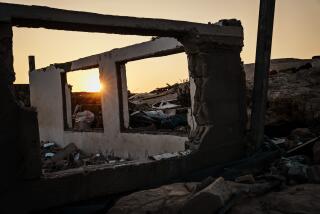Where Will Arafat Stand on the Map of Faith? : Middle East: To Hamas’ spiritual leader, a Muslim Palestine is beyond question.
- Share via
The abductions, murders and bombings perpetrated in Israel by members of the radical Palestinian Islamic movement, Hamas, have shown them to be a potent force. On one level, they are clearly engaged in a power struggle with Yasser Arafat, one that the PLO chairman cannot afford to lose. On another level, they are at war with nothing less than Western civilization, and this makes the response to them by both Arafat and Israeli leaders an extremely sensitive matter.
This point of view was brought home to me in a conversation I had with the Hamas spiritual leader, Sheik Ahmed Yassin, shortly before he was arrested by the Israeli government several years ago. I met the aging sheik, left virtually paraplegic by a crippling neural disease, in the small prayer room of his simple residence on a hillside above the town of Gaza. The walls of the room were mostly devoid of decoration, but there were two prints: one was a picture of the Muslim shrine, the Dome of the Rock, in Jerusalem; the other was a drawing of the holy book, the Koran, superimposed on a map. The drawing showed the book as if it had arms that extended from Indonesia to Africa--in a sense, embracing the world.
This theme of Islam as a world power and a force in Palestinian affairs was verbalized in our conversation. At that time, before the PLO-Israeli accords, the sheik thought that Arafat had a responsibility to make Palestine an Islamic state, since the overwhelming majority of its residents were Muslims. The idea of a secular state serving the interests of all religious communities seemed alien: an American notion, not a Palestinian one. If he went to America, the sheik explained, he would obey American laws. In Palestine, one should obey the laws of Islam.
It was a simple but profound equation: secular society on one side, Islam on the other. It was a comparison that I heard repeatedly in interviews with religious nationalists throughout the Islamic world. With only a switch in the name of the religious tradition, it was expressed by Buddhist nationalists in Sri Lanka, Hindu and Sikh nationalists in India and Jewish nationalists in Israel: Western civilization was on one side, religion on the other.
Behind this simple equation was often a vision of social reality that involved a series of concentric circles. The smallest were families and clans. Then came ethnic groups and nations. The largest and implicitly the most important circles, encompassing the others, were international civilizations.
From this point of view, the great civilizations are Islam, Buddhism, Hinduism or the civilizations of other religious traditions. Then there is Western civilization, which, although it claims today to be secular and universal, is seen by religious leaders like Sheik Yassin as still, in essence, the culture of Christian Europe--as parochial in its own way as many Westerners think Islam to be.
In Hamas’ view, nations such as France, England and the United States are subsets of Western civilization. Nations such as Egypt, Iran and the incipient Palestine are subsets of Islam. This view of the rivalry of civilizations is the basis for several striking ideas that follow as logical conclusions to its premises:
* The notion that the spread of Western-style secular culture and politics is a form of colonialism, for it is one civilization forcing its ideology on another.
* The idea that America, even when not directly involved with a region like Palestine, is implicitly the enemy, since it is the fount of secular ideology and its most powerful proponent.
* The fear that secular leaders like Arafat are not just bad Muslims but agents of a foreign ideology. This line of reasoning explains why America is so readily a target of religious terrorism, and why secular leaders like Israel’s Yitzhak Rabin and the PLO’s Arafat are so deeply mistrusted by the followers of Hamas. It also explains why Arafat’s dilemma is so profound. He must combat Hamas as a political enemy, and yet his very act of defying the Islamic movement is testimony to the idea that his secularism is an enemy of Islam. This is especially true when Israel and America are seen as goading him on.
In order for Arafat to succeed, he must fight Hamas on his own Palestinian--and Islamic--terms. To act in a way that would appear to cave in to outside pressures and non-Islamic interests, however, would be political suicide. Or worse. The graves of assassinated secular leaders--including Egypt’s Anwar Sadat, India’s Indira Gandhi and Algeria’s Mohammed Boudiaf--are tragic testimony to what can happen to leaders who are identified as enemies of religious nationalism. If Arafat suffers that fate, it will be not only Palestine’s loss, but also Israel’s and the world’s. To avoid it, he must be allowed to do what secular leaders in similar situations around the world have attempted to do: embrace aspects of their traditional culture even as they attempt to isolate and destroy the activists who are its most extreme proponents.
More to Read
Sign up for Essential California
The most important California stories and recommendations in your inbox every morning.
You may occasionally receive promotional content from the Los Angeles Times.













